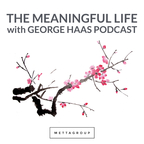
Meditation x Attachment with George Haas
Summary: Welcome to the Meditation x Attachment with George Haas Podcast (formerly The Meaningful Life). Each episode will explore the connections between ancient Buddhist meditation techniques and modern psychological attachment theory. Learn more at mettagroup.org.
- Visit Website
- RSS
- Artist: Mettagroup | George Haas
Podcasts:
George discusses the concept of realizing mind, or in more Western terms awareness of awareness, and describes the differences between sensing and awareness. From the"Contemplation of Mind" section in Chapter 4 of Mahasi Sayadaw's Manual of Insight.
Moving on to the "Contemplation of Mind" section of Mahasi Sayadaw's Manual of Insight, George discusses the eight mind states ranging from the ordinary to the esoteric and explains how meditation leads to the conclusion that most experiences are neutral rather than pleasant or unpleasant.
George breaks down how the first milestone of spiritual maturity is the ability to recognize that you have a mind-state and that it can distort how you perceive your own sensing experience, and gives a close reading on Pleasure and Displeasure, in both its Worldly and Unworldly forms. From Mahasi Sayadaw's Manual of Insight.
Embarking on a new section of Mahasi Sayadaw's Manual of Insight, George explains why "mind" is considered the sixth sense in Buddhism and unpacks how feelings can be pleasant, unpleasant or neutral.
After a close reading of the text explaining how the sensing experience unfolds based on past experiences, George gets into how childhood experiences influence future mind states and reviews the first foundation of mindfulness. This episode wraps up the Contemplation of the Body section of Mahasi Sayadaw's Manual of Insight. If you would like to engage directly in the practice of dāna (generosity), you are invited to help support us with a contribution to the Mettagroup Scholarship Fund. Subscribe on iTunes or Stitcher.
Continuing his discussion of the Contemplation of the Body section of Mahasi Sayadaw's Manual of Insight, George gets into the sense of self vs. no-self and how the mind interprets the sense experiences.
George narrows in on what the "mind door" is and discusses how thought is related to the typical physical senses. This discussion continues Chapter Four of Mahasi Sayadaw's Manual of Insight.
Based on the traditional categorizations of earth, fire, water and air, this episode examines the somewhat pre-scientific point of view on the four energies in the body. Of course, there's some enlightening tangents, including mortality and aging, and the purpose of your personal practice. From Chapter Four of Mahasi Sayadaw's Manual of Insight.
This episode wraps up the section of Mahasi Sayadaw's Manual of Insight that deals with the physical aspect of sensing as it relates to practice. Along with a succinct review of the chapter, George gets into codependency and how early childhood affects attachment in adult life.
George reviews the paths to classical enlightenment and explains how it is indeed possible for ordinary householders to achieve insight, before getting into some specific techniques for finding equanimity within each strand of the six sense gates: eye/seeing, ear/sound, nose/odor, tongue/taste, body/touch and mind/mental objects. The basis of this discussion is Chapter Four (section: The Case of Seeing) from Mahasi Sayadaw's Manual of Insight.
With poignant contemporary observations, and a dose of humor of course, George explains how developing mindfulness leads to equanimity even in the face of defilements that arise during practice. From Chapter Four of Mahasi Sayadaw's Manual of Insight.
Defilements, or impurities, naturally arise during practice. George describes how this relates to vipassana practice, breaking down how the meaning of the word "vipassana" ("divide' and "see") connects to the different aspects of the sensing experience, and how triple noting can be an effective way to process these defilements. This continues Chapter Four of Mahasi Sayadaw's Manual of Insight.
A conversational look into the body-mind connection and how it relates the first five states of the 16 stages of insight. This continues George's exploration of khanika samadhi (momentary concentration) from the Development of Mindfulness chapter of Mahasi Sayadaw's Manual of Insight.
George continues on Chapter Four of Mahasi Sayadaw's Manual of Insight, delving into the physical nature of seeing and how it connects to consciousness. A spirited Q&A with the students ensues, covering the concept of khanika samadhi (momentary concentration) and why George supports a hybrid metta-vipassana meditation technique.
George discusses the five kinds of phenomena that arise during practice, describing how to explore them and how they relate to neuroscience. Along the way he gets into his own path and how it serendipitously ended up following the 16 stages of insight laid out in the Theravada Maps. This talk is from Chapter Four of Mahasi Sayadaw's Manual of Insight.